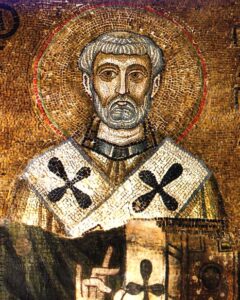Patronage in 1 Clement
The early Christian letter of 1 Clement was written from the church in Rome to the Corinthians around AD 90. The long epistle admonished the divided Corinthians to reunite under their appointed leaders. Though it did not become part of the New Testament canon, 1 Clement was highly regarded by the early Church and reveals early Christian theology.
 No other early Christian documents, including those in the New Testament, speak as directly about patronage. As I was reading through the letter recently, it was notable how much this early Christian author communicated about God/Christ as a patron. This post summarizes the letter’s teachings about patronage.
No other early Christian documents, including those in the New Testament, speak as directly about patronage. As I was reading through the letter recently, it was notable how much this early Christian author communicated about God/Christ as a patron. This post summarizes the letter’s teachings about patronage.
1. Jesus is the benefactor. 1 Clement refers to Jesus as a “patron,” or “benefactor” three times (36.1; 61.3; 64.1). The Greek term in each instance, prostatēs, means “one who stands before,” as in ruler, guardian, or patron (LSV s.v.) The προστάτ- terms connote status and authority. The only occurrence of the term in the New Testament, for Phoebe in Rom 16:2, is usually translated as “patron” or “benefactor,” referring to her the way she helped Paul and other Christians. The basic idea in 1 Clement is that Jesus takes care of us. He is the “benefactor and helper of our weakness” (36.1). He advocates on our behalf and helps to provide for our needs. For this reason, the three verses in 1 Clement refer to Jesus “high priest and benefactor.” In his role as a priest in the heaven before the father, Jesus mediates, advocates, and secures resources for us, just as a good benefactor does.
In a Psalm-like prayer to God, Clement recognizes God as the sovereign who assigns people to their place. “You humble the pride of the proud; you destroy the plans of nations; you exalt the humble and humble the exalted; you make rich and make poor; you kill and make alive. You alone are the benefactor of souls (εὐεργέτην πνευμάτων) and the God of all flesh” (59:3)
2. God gives gifts and deserve recognition. As our patron in heaven, God gives what we need. He provides us gifts which are vital for our salvation. Christians are to recognize and remember the benefactions he provides. Here are the admonitions:
- Let us look steadfastly unto the Father and Maker of the whole world, and hold fast to His splendid and excellent gifts and benefits of peace (δωρεαῖς τῆς εἰρήνης εὐεργεσίαις; 19.2)
- Take care, dear friends, lest his many benefits (αἱ εὐεργεσίαι αὐτοῦ) turn into a judgement upon all of us (21.1)
- Let us not be double-minded, not let our soul indulge in false ideas about his excellent and glorious gifts (ταῖς ὑπερβαλλούσαις καὶ ἐνδόξοις δωρεαῖς αὐτοῦ; 23.2)
- Understand the magnificence of the gifts that are given by God (αὐτοῦ δεδομένων δωρεῶν; 1)
- How blessed and marvelous are the gifts of God (τὰ δῶρα τοῦ Θεοῦ), dearly beloved! Life in immortality, splendor in righteousness, truth in boldness, faith in confidence, self-control in sanctification! (35:1)
- Let us therefore contend, that we may be found in the number of those that patiently await Him, to the end that we may be partakers of His promised gifts (τῶν ἐπηγγελμένων δωρεῶν; 35.4)
- The one who made and created us…prepared his benefits (τὰς εὐεργεσίας) for us before we were born (38:3)
As indicated above, 1 Clement uses two terms for what God gives: dōrea (gift) and euergesia (benefit, benefaction, act of kindness). In 44.4, the author also refers to the communion elements as “the gifts” (ta dōra) mediated by the bishop to the church.
3. The Christian community should reflect God’s patronage and benefactions. 1 Clement advocates for God-centered patronage. Relationships between believers should reflect the fact that God is the original source of all things. “Let the rich support the poor; and let the poor give thanks to God.” Within the community of faith, people with resources from God must help others, and those who receive help communicate their gratitude back to God. In this system, God (not any human) is the initial giver of gifts and ultimate recipient of thanks.
This point is critical in 1 Clement because the main problem is that younger leaders had deposed older bishops in Corinth. Such an action, by claiming a status higher than they ought and failing to honor the divinely appointed leaders, ignored the system God ordered for his community (cf. 16; 32; 44.4; 57.2; 59; 61.2). According to the author if 1 Clement, the behavior of the rebellious faction was “disgraceful, dear friends, yes, utterly disgraceful and unworthy of your conduct in Christ” (47.6).
In sum, the early Christian letter of 1 Clement illustrates how early Christians adopted and adapted the cultural system of patronage to communicate theological realities about Christ and his community. Westerners often have a pejorative view of patronage, so the letter offers an interesting positive example of theology in such a context.
You can learn more about patronage at https://honorshame.com/patronage/.

Thank you for this interesting study. I find this quote to be particularly revealing of the divine patronage system: “Let the rich support the poor; and let the poor give thanks to God.”
It reminds me of Paul’s words in 1 Corinthians 10:31-33 where there is a similar benefaction structure which exists for the salvation of many.